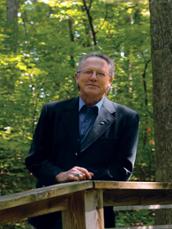Norlyn Bodkin
A budding legacy: his dream turned into an outdoor living classroo
Professors We Love Originally published in Spring 2008, this is just one of many stories from Madison magazine's award-winning Professors You Love series, written by JMU students and alumni, about the professors that have made the most impact on their lives — then, and now.
Originally published in Spring 2008, this is just one of many stories from Madison magazine's award-winning Professors You Love series, written by JMU students and alumni, about the professors that have made the most impact on their lives — then, and now.
I met Dr. Norlyn Bodkin in the summer of 1973 after a dismal freshman year. I needed to attend summer school, and one of the classes I took was his Biology 102. Since that seven-week session, I have known Dr. Bodkin to be a very down-to-earth, personable and dedicated teacher. He is, in my opinion, one of the most innovative professors in the history of Madison.
"He concerned himself with seeing that each student achieved his or her maximum potential."On a class field trip that summer of '73, we traveled to Dolly Sods, W.Va., in Dr. Bodkin' s home state. We spent the entire day examining and probing the wild fields. Dr. Bodkin pointed out how important the ecosystem is in relationship to our existence on this planet. He showed us the various plant and animal inhabitants native to the Dolly Sods area. As always, he concerned himself with seeing that each student achieved his or her maximum potential.

Dr. Bodkin's teaching philosophy, which emphasized the importance of hands-on learning, was probably the impetus for his proposal in 1977 that JMU establish an arboretum. Throughout his academic career he led students into the fields, woods and mountain habitats of the region to study plant life. He has also led botanical trips to the Galapagos Islands, upper Amazon rain forests and Ireland.
His arboretum dream blossomed into the Edith J. Carrier Arboretum in 1985, and he served as director until his "semiretirement." He still teaches courses for the arboretum as an educational coordinator.
Now the Edith J. Carrier Arboretum and Botanical Gardens hosts hundreds of educational and recreational field trips and tours for schoolchildren, senior-citizen groups, civic groups and community clubs. Visitors learn about nature, botany, horticulture, plant species native to the Appalachians and ecology, thanks to Dr. Bodkin's legacy.

